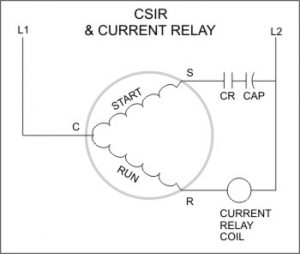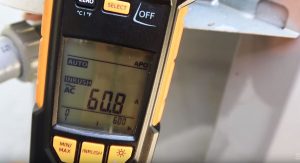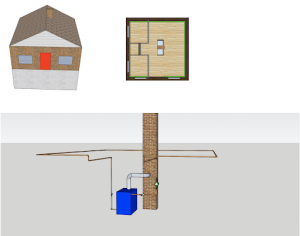Tech Tips

Now is the part where we get specific about start capacitors and inrush. If you haven't read the first three parts, please do so before reading this one, or it may not make sense. (You can find Part #1, Part #2, and Part #3 at these links.) I'm going to come out and say it […]
Read more

Before we get into the parts that will ruffle some feathers, let's talk a bit about what a “Start” capacitor is and what it does. First, let's review that both start and run capacitors connect between the leg of power opposite of compressor common and the start winding. Even though it seems like a run capacitor […]
Read more

Thought Experiment #3 – The Start Winding Has No “Inrush” with a run capacitor only The name “start winding” is an antiquated term for the single-phase residential industry. It came from the days when CSIR (capacitor start, induction run) motors were still used commonly. In a CSIR motor, the start relay removes the start winding […]
Read more

This series of articles is one of those that will bug a lot of people because it will go against a lot of what you've been told about compressors, start capacitors, and inrush current. For that reason, I want you to work through a few thought experiments first and maybe even stop and try it […]
Read more

This tip was created by Jason Pinzak and originally posted on the HVAC Technician's Facebook group. It is reposted here with permission from Jason. Thanks! Contactors are useful in commercial and industrial applications, particularly for controlling large lighting loads and motors. One of their hallmarks is reliability. However, like any other device, they are not […]
Read more

I get emails from time to time with questions that stem from the articles or the podcast. This was a great question, but I was not the best person to answer it. I reached out to Jeff Neiman, our resident HVAC School chiller tech, and he answered it. Here is the question: Hello Bryan, Thanks […]
Read more

This is a subject that even many commercial guys don’t have to consider. For the majority of equipment, even refrigeration equipment, all that is required for proper oil return is to size the suction line properly, trap the suction line as needed, and allow for proper slope towards the compressor. Then we get into larger […]
Read more

Another follow-up article by Michael Housh… Enjoy! In this article, I thought I would show a pump curve and match it up with our system head-loss curve that we created in the last article, but before I do that, I thought I would talk a little bit more about the system head-loss curve and why […]
Read more

Here is another excellent article from Michael Housh, owner of Housh Home Energy and a regular contributor to HVAC School. Thanks, Michael! I thought I would go through a simple example of sizing a hydronic circulator for an application. This is a made-up scenario, but I sketched out a 20’ x 20’ square home with […]
Read more







